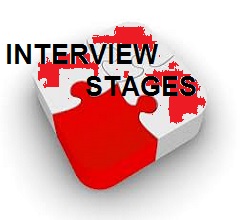Stages of an Interview

Being tested has never been easy, be it some exam or an interview you appear for. To ace these tests it is always good to know the parts of it that one would have to tackle with expertise. When we know about a thing and its parts it gets easier to achieve the desired results. Interviews in the same way have never been easy for anyone. And many times people flunk too. What one can do is to try the best and to put in his best. And in order to do that it’s important to know not only what an interview is, but also its parts. How to deal with each one with perfection, and how to prepare for it. So, in this article we have you covered for the stages of an interview.
Good luck! We hope you gain the best out of this piece and ace your interview.
Stages of an interview
- Introductory Stage
- Exchange of Information
- Question Answers Based Stage
- Inquiry Stage for Applicants
You might be getting baffled from these stages so we will separately discuss each and every stage of an interview.
First Stage: Introductory stage of an Interview
Introductory stage is all about introduction of applicant. This is first stage of an interview where interviewers judge contender on the basis of his/her attitude and physical appearance. This is a stage of an interview where your first impression really counts and plays a vital role in success of your interview session. This stage is depends on all of your action and ways you behave at front of your interviewers. It comprises four things
- Greeting
- Handshake
- Appearance
- Demeanor
Moreover, in introductory stage applicants give their CV or Resume to officials. Furthermore an idyllic tip for applicants is not to sit before offered by interviewers. Precisely, it is a stage that makes easy for both applicant and interviewers to communicate with each other.
Second Stage: Information exchange stage
In this stage not only contenders give his/her background information to interviewers but interviewers also explain little bit about job requirements. Moreover, it makes easy for applicants to comprehend the job criteria. Furthermore, interviewers explain a bit about post for which contenders applied. Now what sort of information an applicant’s exchange with interviewers is query?
- Background information about job or curricular activities
- Qualification or educational background
- His/her interests and potential
- Ambitions for future
- Passion for applied job
Third Stage: Question Answers Stage
It is stage that sometimes becomes problematic, challenging and tricky for contender to handle. Therefore, applicants should come with full preparation for an interview. In this stage, officials ask different types of questions from contenders to test their potential and metal power. Questions can be based on different levels like they might be asked you to solve certain problem. They can also give you certain situation and ask you that how you will handle that. This whole stage is test of you competency and intelligence so be aware. In addition, always show positive attitude towards questions, do not be hesitate or become aggressive. Third stage is most imperative stage because it decides about your future and intelligence. In addition, always leave unfamiliar things while replying to interviewers because that can affect your intelligence and confidence level. So behave calmly and positively at front of your officials while giving interview.
Fourth Stage: Applicants can ask questions
This is another important stage for an applicant. In this stage, contenders can ask questions from interviewers about
- Working timing
- Inquiry about extra bonus
- Salary package
- Job post
Therefore, whenever you are preparing for an interview always make few questions too. These questions show your interest level plus confidence to officials. If applicants will not ask anything and leave the interview room then it can affect their career and chances of getting that job too. So be active and always leave after asking your desired questions and good bye. Moreover, say thank you to interviewers by expressing that you enjoyed your interview. It also helps contenders in getting that job. Always remember one thing that three things always play an essential role in your success
- Your appearance
- Your confidence
- Your intelligence
Concluding the article, as you read all about the parts of an interview, it’s important to find out where you may lack and improve it so that for the next time you appear for an interview you ace it without much effort. Do you have more tips to share?


Leave a Reply